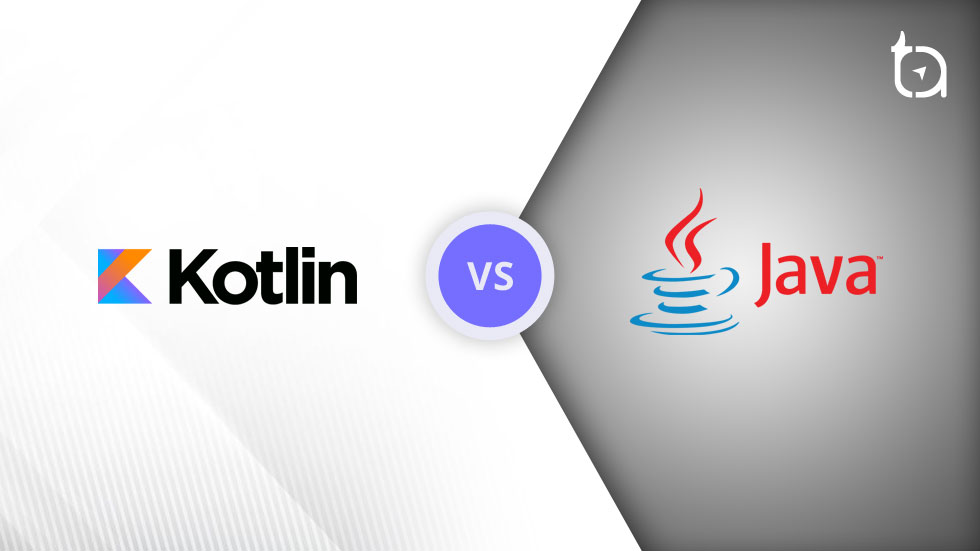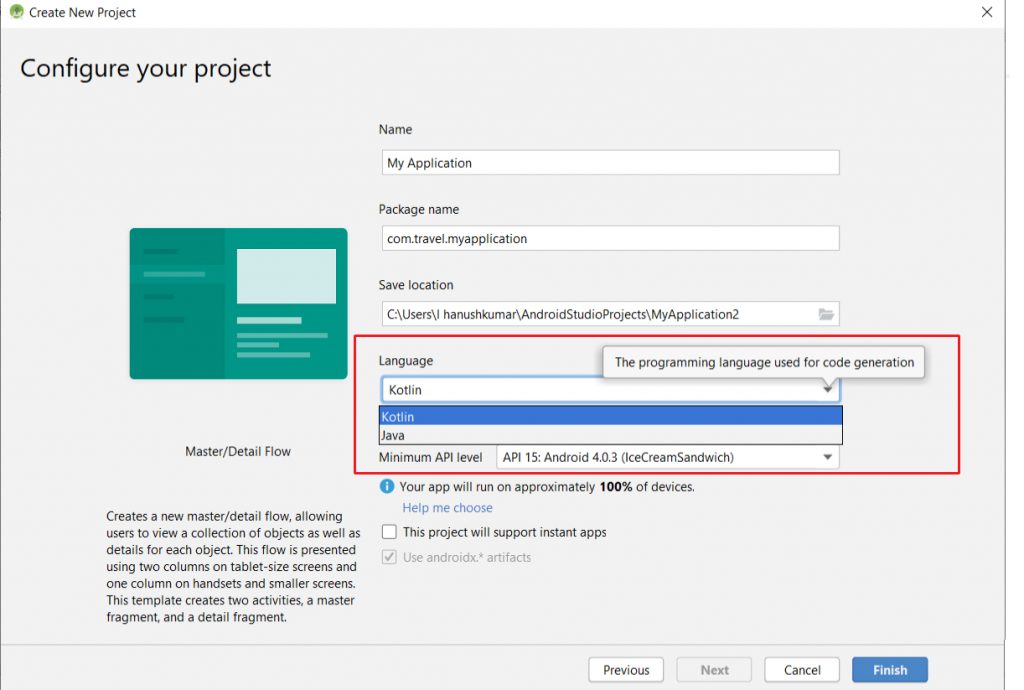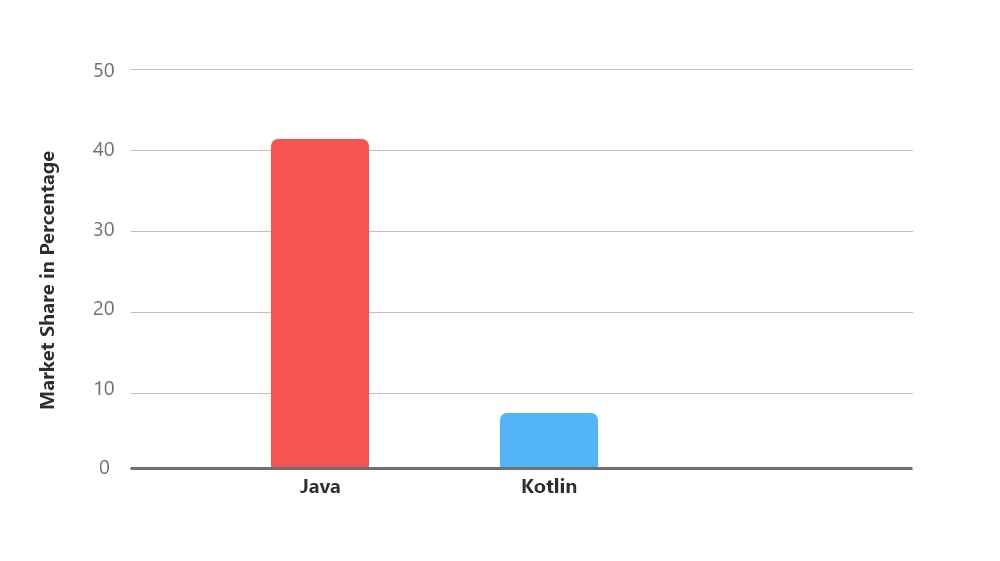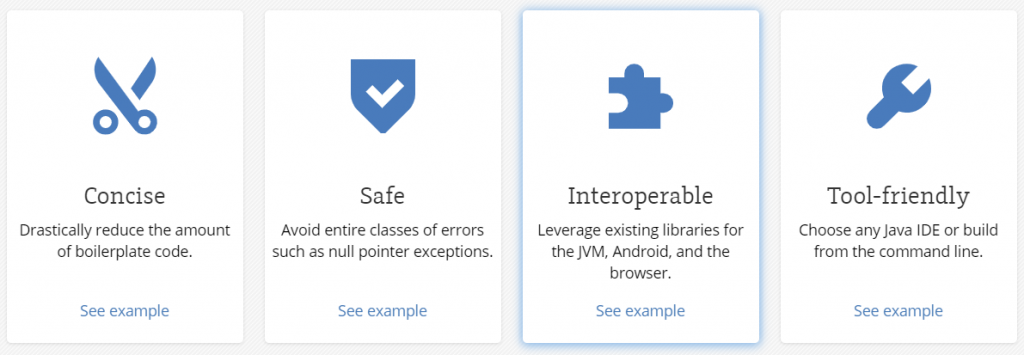Kotlin Vs Java | A Comparison Between Two Powerful Technologies

Author : John Prabhu 6th Jan 2020

If you are new to mobile app development, below is an image of Android Studio for your reference. While setting up your Android Studio for Android app development, it will ask you to choose your preferred coding language. Here begins the comparison – Kotlin vs Java.

Though Kotlin is not as popular as Java for various reasons, it has started to make some noise in the Android developer community.
According to Statista’s “Most used programming languages among developers worldwide” survey, Kotlin had a market share of 6.1% and Java had a whopping 41.1% in early 2019. Remember, this is compared with all technologies and not only Android mobile application technology. So, which one should you choose for your app development project? Kotlin or Java? It’s better to take your time. Let’s start with the oldest language Java and then explore the all-new Kotlin.

An Overview of Java
Java is a general-purpose coding language, which is object-oriented, class-based, and built to have very few implementation dependencies. It is popularly known as “Write Once Run Everywhere (WORA)” language. It is so because, when you are done with the coding part, you will have the .java file that has to be compiled into a class file. The compiled class file is in the machine-readable format, i.e., binary format. Hence, with Java, you can write a program once and run it on any machine. As Java has a user base all around the world, it is acknowledged as a universally accepted language for mobile app development. Also, it can be used to develop apps for desktops as well.
Why Java?
Portable
Being able to run on the platform-independent Java Virtual Machine, Java has the advantage of being highly portable. As a result, Java can run on almost every platform.
As the Java Virtual Machine (JVM) is platform-independent, Java programs can be executed on various platforms such as Android, iOS, and even windows. Thus, Java is highly portable and facilitates app development.
Larger Community Base
As said earlier, the market share of Java is quite higher than that of Kotlin. Hence, Java has more formidable community support, and you won’t be left stranded as you get a lot of support from the community. The active community has a lot of experts in it, and they are ready to give answers to your questions.
Can Build Hybrid Apps
Another interesting aspect of Java after being portable is, it is not restricted only to building native apps. Yes, you can develop a cross-platform codebase, compile it, and get your desired output builds. Hence, you can build hybrid apps with Java and minimize the overall development time.
Highly Resourceful
Though the Android operating system itself is built using various technologies such as C, C++, Python, Go, etc., Java is undeniably the key player. Hence, Java has ample SDKs and libraries that facilitate the android app development process.
Recommended Read: Top 10 Java Frameworks
Disadvantages of Java
Slow & Expensive
Since the number of lines of code is significantly higher in Java to write a fully functional mobile app, it takes a lot more developer time & effort. As a result, the cost of app development shoots up.
Larger in Size
Also, when it comes to size in the battle between Kotlin vs Java, Java has a big disadvantage when compared to Kotlin.
An Overview of Kotlin
Kotlin is a cross-platform, statically typed, general-purpose programming language with type inference. Kotlin is designed to interoperate fully with Java, and the JVM version of its standard library depends on the Java Class Library, but type inference allows its syntax to be more concise. According to AppBrain, the market share of Kotlin in top apps is 41.48% and has a 25.19% install rate. Also, according to Jexenter, Kotlin is the 6th most popular programming language after Java leading the pack.
The best part about going ahead with Kotlin is that it is interoperable. It means you can use Java code with Kotlin. Also, this particular feature allows you to safely transfer large projects from Java to Kotlin in a step-by-step manner. Moreover, you can use Java libraries with Kotlin without any glitches.

Why Kotlin?
Enhanced Efficiency
Kotlin’s syntax is very cognitive and precise. Developers can take full advantage of the language and improve efficiency. Moreover, you don’t have to write a pile of code. Instead, you can write a few lines and reduce the time taken to develop an app.
Easy Maintenance
It is easy to maintain because it has support from a range of IDEs (Integrated Development Environments). Kotlin is compatible with a host of IDEs and SDKs such as Android Studio coupled with developers’ toolkit.
100% Interoperable
As Kotlin is fully interoperable, you can call Java methods used in an app. So, it is easy for Java developers to get along with Kotlin in no time. Furthermore, you can improve the efficiency of bulky apps built on Java by integrating Kotlin with them and reduce the line of codes.
Reliable
All the versions of Kotlin are inter-compatible. Therefore, you can integrate older versions with new ones without any glitches. Hence, Kotlin is reliable.
Suggested Read: 7 Reasons to Choose Kotlin
Disadvantages of Kotlin
Nothing strikes perfection, and Kotlin is not an exception. It also has a few loopholes which you should be aware of being an app developer.
Fluctuating Speed of Compilation
Many times it is noted that the compilation speed of the language varied and significantly. For some projects, it’s incredibly high, and for some, it shrinks drastically. Hence, before you start with the process of app development, be ready to face such issues.
Lack of Community Support
The new language is finding it hard to have an active community that has enough experience in developing unique apps with distinct needs. Hence, it finds it challenging to solve queries raised by fellow developers.
Relatively Less Number of Developers
Though the language is relatively new, it is not widely known and slowly rising in popularity. Therefore, there is a shortage of well-trained and skilled developers.
Final Thoughts on Kotlin vs Java
As previously stated, the fundamental difference between Kotlin vs Java operation type, speed, and syntax. While Java is bulky in nature, Kotlin is sleek and saves more of developers’ time. Community support is where Java gets an edge, but at TechAffinity, our expert developers have years of experience in building unique mobile apps across various verticals.
Having developed several mobile apps, we are familiar with both Java & Kotlin. With an understanding of the core benefits and features of both these technologies, identifying the relevant technology for the project is an easy task. Send in your project requirements to media@techaffinity.com, and we will get in touch with you.
Also Read: Java vs Python
